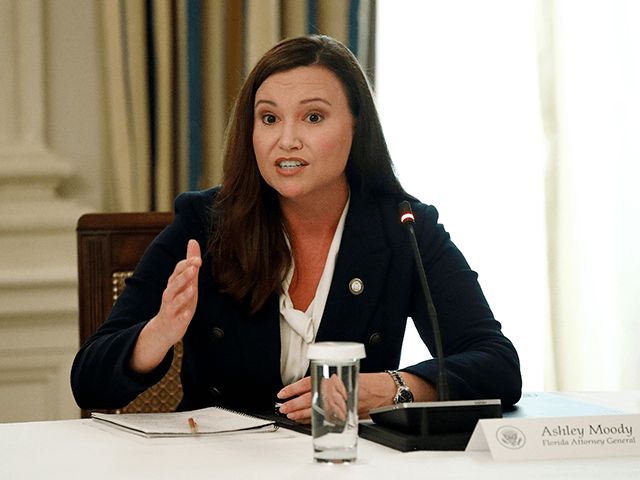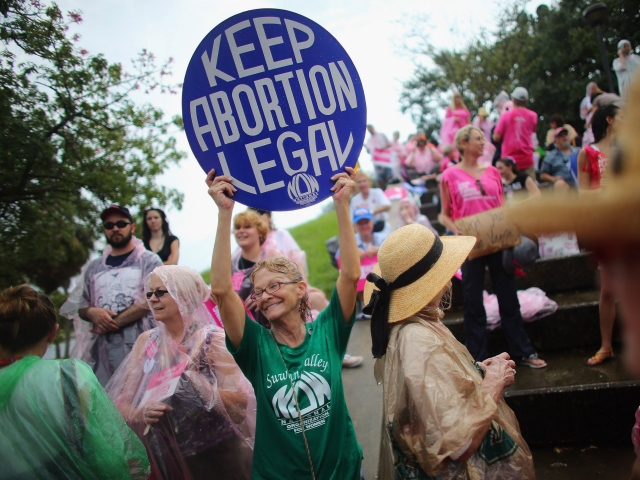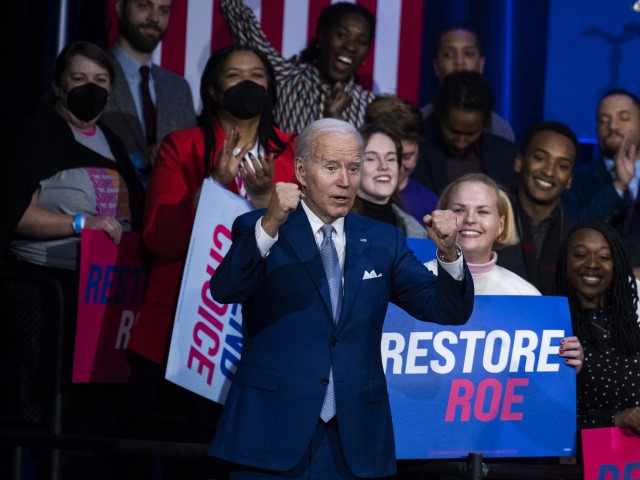Florida Supreme Court Upholds 15-Week Abortion Limit, But Voters Will Decide in November
The Florida Supreme Court issued two significant decisions on Monday, upholding a 15-week limit on abortion in the state while also allowing a proposed amendment that would enshrine the right to abortion in the state constitution to appear on the ballot in November.
The court’s decision to allow the 15-week limit to stand also clears the way for the state’s six-week abortion limit to take effect. Florida Gov. Ron DeSantis (R) signed the 15-week limit in 2022, which Planned Parenthood affiliates in the state almost immediately challenged in court. DeSantis then signed the six-week Heartbeat Bill in April 2023, which contains exceptions for rape, incest, and the life of the mother. The state Supreme Court allowed the six-week limit to remain blocked until it could rule on the 15-week limit.

Florida Gov. Ron DeSantis (Paul Hennessy/SOPA Images/LightRocket via Getty Images).
In its ruling on Monday, the court’s justices wrote in a majority opinion that Planned Parenthood, the plaintiff in the case, “cannot overcome the presumption of constitutionality and is unable to demonstrate beyond a reasonable doubt that the 15-week ban is unconstitutional.”
The justices also wrote that “[c]onsistent with longstanding principles of judicial deference to legislative enactments, we conclude there is no basis under the Privacy Clause to invalidate” the 15-week limit.
As a result of their ruling, the justices said the “six-week ban will take effect in thirty days.”
However, in its second decision, the Florida Supreme Court is allowing an abortion ballot measure to move forward, meaning Florida voters will have the chance to vote on the issue in November.
The proposed amendment is backed by Floridians Protecting Freedom — a coalition of left-wing groups including Planned Parenthood and the American Civil Liberties Union (ACLU) of Florida — and bars the state from restricting abortion before viability (approximately 24 weeks) or “when necessary to protect the patient’s health, as determined by the patient’s healthcare provider.”
Florida Attorney General Ashley Moody had asked the state’s high court to block the amendment from appearing on the ballot in November. One of Moody’s main concerns was the measure’s use of the term “viability,” which she says could have several meanings and confuse voters.

Florida Attorney General Ashley Moody (AP Photo/Patrick Semansky, File)
“We approve the proposed amendment for placement on the ballot,” justices wrote in their opinion.
“That the proposed amendment’s principal goal and chief purpose is to limit government interference with abortion is plainly stated in terms that clearly and unambiguously reflect the text of the proposed amendment,” they wrote. “And the broad sweep of this proposed amendment is obvious in the language of the summary. Denying this requires a flight from reality.”
The state’s high court noted that its decision “takes no position on the scope of legislative discretion that would remain if the proposed amendment were to become law.”
The justices wrote:
The question for our consideration here is not whether the proposed constitutional language itself is free of any ambiguity or whether there are uncertainties regarding the potential legal effect if the proposed amendment were to pass but whether the ballot summary misleads voters as to the new constitutional language voters are asked to adopt in the proposed amendment itself. In other words, it asks whether the ballot summary will give voters a false impression about what is contained in the actual text of the proposed amendment.
The ballot summary essentially follows the language of the proposed amendment. It says nothing more and nothing less than what the operative language of the proposed amendment itself says. In light of this almost verbatim recitation of the text of the proposed amendment, it cannot be said that the ballot summary will mislead voters regarding the actual text of the proposed amendment.
If Florida voters pass the measure with at least 60 percent support in November, the amendment would undo the six-week limit and basically create a permanent right to abortion in the state that could only be undone with another ballot measure or an uphill legal battle.
The abortion activists backing the measure surpassed the number of required signatures in January, and the measure will appear as “Amendment 4” on the general election ballot, according to state officials.

Protesters stand together during a Planned Parenthood rally on August 29, 2012, in Tampa, Florida. (Joe Raedle/Getty Images)
Pro-abortion groups lauded the State Supreme Court’s decision to allow the ballot measure to move forward, while also decrying its decision to uphold the 15-week limit.
Jessica Mackler, the president of EMILYs List — an organization that supports pro-abortion Democrat women running for office — said:
The stakes for protecting reproductive freedom in Florida have never been higher. With a near-total abortion ban set to go into effect in 30 days, essential health care will be pushed out of the hands of millions because of this Florida Supreme Court decision. But Floridians have the opportunity to fight back against this Republican law that strips them of their bodily autonomy just like voters have in every other abortion ballot initiative across the country.
Pro-life groups conversely celebrated the decision upholding the state’s 15-week limit while also slamming the abortion ballot measure.
“Today’s victory for unborn children who have a heartbeat and can feel pain is in line with the views of the majority of Floridians who want to protect babies and serve mothers and families,” Susan B. Anthony Pro-Life America’s State Policy Director Katie Daniel said in a statement:
As Florida faces what may be its biggest ballot fight yet, Gov. Ron DeSantis must be at the forefront of protecting Florida from Big Abortion’s attempt to eliminate the rights of unborn children, parents, women, and girls. Gov. DeSantis signed protections for babies who feel pain and have a heartbeat into law and now he must lead in defending those protections.
Florida Voice for the Unborn Executive Director Andrew Shirvell said his group was “profoundly disappointed in the Florida Supreme Court” for allowing the ballot measure to advance but called the potential enactment of the six-week limit a “silver lining in an otherwise dark day for Florida’s unborn children.”
President Joe Biden’s reelection campaign notably released a memo moments after the decisions were released, saying it sees Florida as winnable because of its ongoing strategy to galvanize Democrats around the issue of abortion.
“Abortion rights will be front and center in Florida this election cycle,” Julie Chávez Rodríguez, Biden’s campaign manager, wrote in the memo, first shared with NBC News.

President Joe Biden speaks about the importance of electing Democrats who want to restore abortion rights in Washington, DC, on October 18, 2022. (Tom Williams/CQ-Roll Call, Inc via Getty Images)
Florida is one of nearly a dozen states where pro-abortion activists are working to codify the right to kill the unborn.
The cases are Planned Parenthood of Southwest and Central Florida v. Florida, No. SC2022-1050 and No. SC2022-1127 in the Supreme Court of Florida, and Advisory Opinion to Attorney General Re: Limiting Government Interference with Abortion, No SC2023-1392 in the Supreme Court of Florida.
Katherine Hamilton is a political reporter for Breitbart News. You can follow her on X @thekat_hamilton.





Comments are closed.